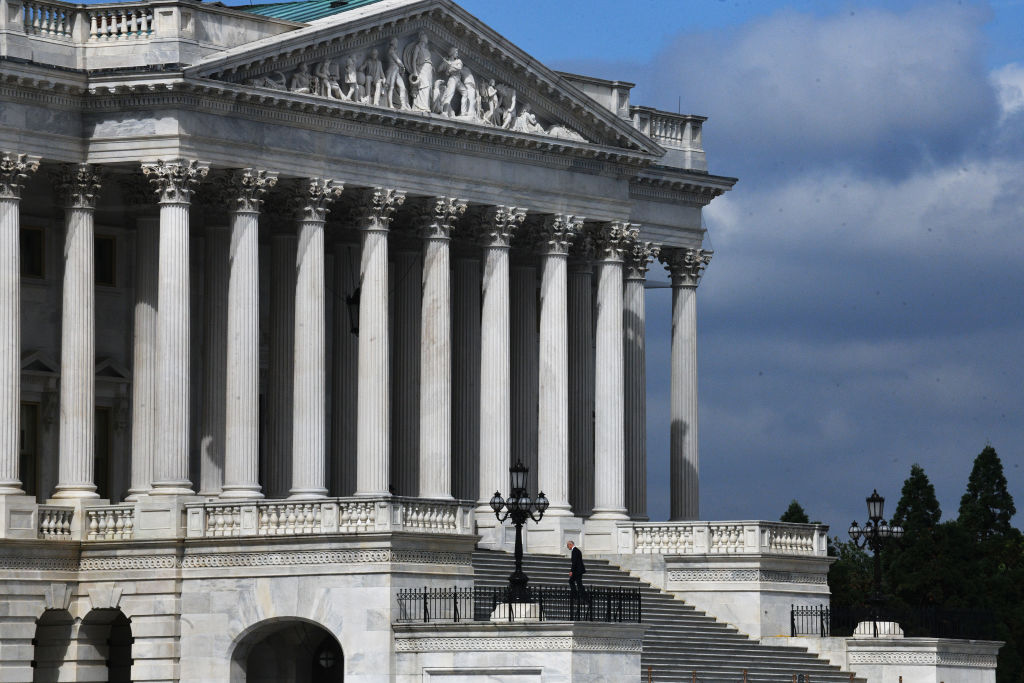During the Philadelphia Convention of 1787, as the Constitution’s framers debated the proper design of the Senate, James Madison remarked: “In order to judge of the form to be given to this institution, it will be proper to take a view of the ends to be served by it.” One of the ends of the Senate, Madison explained, was to protect against “impetuous counsels.” By staffing the Senate with citizens of great stature and granting them lengthy terms in office, Madison laid out how the Senate could be a place of slow and reasoned deliberation. By slowing the pace of politics, the Senate would help ensure that reason—not passion—would shape our public policy.
There was something missing from Madison’s summary of how the Senate would become, to paraphrase George Washington’s famous (and perhaps apocryphal) quip, a sort of “cooling saucer”: the filibuster. Madison figured the Senate could promote reason and deliberation in our politics without a supermajority voting requirement. In fact, Madison expressly rejected proposals for a supermajority voting requirement in the new federal legislature. As he wrote in Federalist No. 58:
It has been said that more than a majority ought to have been required for a quorum; and in particular cases, if not in all, more than a majority of a quorum for a decision. That some advantages might have resulted from such a precaution, cannot be denied. It might have been an additional shield to some particular interests, and another obstacle generally to hasty and partial measures. But these considerations are outweighed by the inconveniences in the opposite scale.
In all cases where justice or the general good might require new laws to be passed, or active measures to be pursued, the fundamental principle of free government would be reversed. It would be no longer the majority that would rule: the power would be transferred to the minority.
It’s not surprising that Madison chafed at a supermajority voting requirement in the legislature. After all, the theory of democratic republicanism that he helped translate into an actual government accepts the ultimate authority of the majority. For Madison, constitutionalism was an attempt to shape, temper, and constrain the majority’s will, not thwart it. “My idea of the sovereignty of the people is, that the people can change the constitution if they please, but while the constitution exists, they must conform themselves to its dictates,” he wrote.
Madison was not blind to the constraining power of procedure. The Constitution baked in protections for minorities and fostered a more reason-driven politics. It did so not only through substantive guarantees like the First Amendment, but also through procedural guarantees like Article I, Section 7, which requires bills to pass both the House and the Senate and be signed by the president (or be passed over the president’s veto) to become law.
As Greg Weiner of Assumption University has explained, Madison designed a system that would complicate turning a bill into law. It would take time. And that time would give citizens and politicians alike a chance to step back and think together—to talk together, to reason together. In the process, though the majority would ultimately prevail, it would “rule reasonably.” Moreover, this cumbersome legislative exercise helped ensure that minority rights would not be trampled upon too easily. As Harvard Law School Dean John Manning has written, “by dividing the legislative process among three institutions answering to distinct constituencies, the bicameralism and presentment requirements [of Article I, Section 7] ... in effect create a supermajority requirement.” Therefore, even without a filibuster, the Constitution aims to promote reasoned deliberation in politics and provides significant protections to electoral minorities.
In theory, the Senate filibuster could supplement and support these worthy goals. Created “by mistake” in 1806 and rarely used before the Civil War, use of the filibuster has spiked in recent decades. But it hasn’t fostered compromise. As it operates today, the filibuster warps minority protection into minority rule, and it has deprived the Senate of its once special status as a place of cool, reasoned deliberation.
Our Madisonian reform proposal.
In a recent article for National Affairs, we proposed a reform to the filibuster that would help reorient the Senate toward its original Madisonian ends. The existing filibuster requires a supermajority of 60 votes to end debate on most bills and allow a vote on final passage. Our reform leaves in place this existing track, while adding an additional track to end the filibuster: receiving the support of a bare majority of senators in two successive Congresses.
Under our reform, if a simple majority of the Senate—not a supermajority—supports ending debate, then the bill would not move to final passage. But it also wouldn’t die, as it would today. Instead, the Senate would be empowered to provisionally pass the bill. This would not be formal passage, meaning the bill wouldn’t get sent to the House (if it originated in the Senate) or to the president’s desk (if it originated in the House). Rather, the provisionally passed bill would hang in limbo until after the next election. Once a new Congress is installed in office, the Senate could release those provisionally passed bills from limbo and bring them to a final vote with a simple majority. If a bill clears the simple majority threshold this second time around, then it will have formally passed the Senate and the existing requirements of Article I, Section 7 would kick in. The bill would be sent to the House, and upon passage in the House, it would head to the president’s desk for his signature.
Our proposal—provisionally floated in The Dispatch last year—would help align the Senate with its original, Madisonian ends.
The proposal would lay the groundwork for more sustained, sober discussion about concrete policies. The framers figured that passionate, fleeting popular majorities might overtake the House at times, but not the Senate: The terms in office were too long, and senators were not popularly elected (they were originally appointed by state legislatures). Modern media and the 17th Amendment (which instituted the direct election of senators) have thrown those assumptions into question. Now, it’s often hard to tell much of a difference between House members and senators. Senators often seem just as interested in posturing on TV and just as disinterested in passing meaningful legislation.
If our proposal were adopted by amending Senate rules, we suspect that senators would behave more responsibly. Today, Congress authors very little of the law that governs our lives; executive branch agencies write the bulk of it. Too often, those agencies warp and stretch old statutory language to make new law at the behest of the president, daring the Supreme Court to call them out. And when the court rightly obliges, politicians lambaste the court.
But with a second track available for moving legislation, senators would have a chance to be more than disingenuous Supreme Court critics. They could actually do something. With the insurmountable supermajority requirement gone, voters would grasp that consequential legislation could actually get passed. They might come to expect more than posturing from politicians, and elections would have more real-world consequences. If the party in power were to hold on to its majority, real and lasting legal change could be afoot. Voters would demand to know how the politician seeking their support plans to vote on the pending legislation that would impact their lives.
Our reform proposal would promote the Madisonian values the Senate was originally designed to advance. It would slow the pace of public policy discussion. Legislative proposals would be placed under sustained public scrutiny. The important, salient bills would become the focus of election cycles and campaigns. As Madison had hoped, this would give more time for the public’s reason, not passion, to win out.
Filibuster reform and strengthening Congress.
The spirit of our proposal is Madisonian: This is about tinkering, not revolting. We live in a different country than the one Madison helped build. But the need for a Madisonian Senate—a refuge for reason—is stronger than ever.
The Constitution has proven to be the key mechanism for conserving the fruits of the American Revolution, but it was designed with certain fundamental assumptions in mind. If the system is to function well, it is important that those core assumptions more or less hold true.
One such assumption was that the legislature would be the most powerful and active branch of government. As Madison observed regarding the state governments: “The legislative department is everywhere extending the sphere of its activity, and drawing all power into its impetuous vortex.” The Constitution ensured that the legislature would be representative and responsive in wielding power. And as a restraint, the Constitution made the exercise of that power cumbersome and unwieldy. However, Madison’s assumption regarding the power of the legislature no longer holds true. As Yuval Levin observed, “Congress is weak because its members want it to be weak.” That’s an issue not just for purposes of responding to current real-world problems, but also for the long-term health of our constitutional order.
Why? Because the framers fashioned Congress as the institution capable of coping with both our country’s size and our deep differences, two qualities that make us great but also so difficult to govern. Just read Madison in Federalist No. 10. He knew America would be massive, and he knew Americans would disagree over just about everything (“The latent causes of faction are thus sown in the nature of man”). Madison and the other framers’ solution was to filter our deep disagreements through a powerful representative legislature. Bargaining and compromising between different constituencies represented in Congress—not top-down executive branch regulations or court rulings—would shape policy.
In short, the framers gave us an institution to work out our deep and varied divisions, and it’s called Congress. If we don’t strengthen that institution—if we don’t empower it to live up to its awesome responsibility under our Constitution—our divisions will only continue to fester. We’ll keep trying to resolve them through presidential elections and court cases, which will never do the trick. We’ll continue to fail to take advantage of the mechanisms by which our system of government empowers us to work out our differences, or at least live with them.
We’re not advocating that the filibuster be scrapped wholesale. Sometimes a time-honored political or legal practice deserves serious respect. But such respect has limits—like the limits of common sense. According to Madison:
Is it not the glory of the people of America, that whilst they have paid a decent regard to the opinions of former times and other nations, they have not suffered a blind veneration for antiquity, for custom, or for names, to overrule the suggestions of their own good sense, the knowledge of their own situation, and the lessons of their own experience?
That’s still the case. And it’s why it’s time we call on our senators to amend the filibuster.





Please note that we at The Dispatch hold ourselves, our work, and our commenters to a higher standard than other places on the internet. We welcome comments that foster genuine debate or discussion—including comments critical of us or our work—but responses that include ad hominem attacks on fellow Dispatch members or are intended to stoke fear and anger may be moderated.
With your membership, you only have the ability to comment on The Morning Dispatch articles. Consider upgrading to join the conversation everywhere.